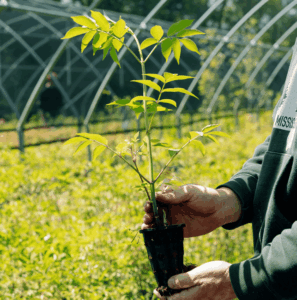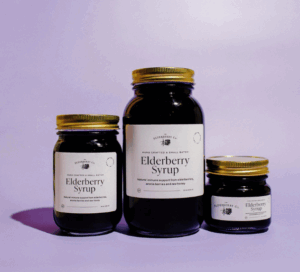We live in a world of hyper-convenient medicine cabinets and big pharma-sponsored prescriptions. But our modernity has caused us to overlook the herbal allies that have been supporting human health for centuries. Among these, elderberry – particularly in syrup or extract form – has been known in natural health communities as a go-to remedy for colds, flu, and immune resilience. But is the buzz around elderberry just another holistic health myth, or does it actually have the science to back up its long-standing reputation?
In this blog, we’ll explore what makes elderberry a staple in immune health regimens, how it compares to pharmaceutical alternatives, and why incorporating it into your seasonal wellness toolkit could be both an environmentally and biologically wise decision.
The Roots of Elderberry Use
Elderberry (Sambucus nigra) has a rich history across Europe and North America. Used for generations by herbalists and indigenous communities, the berries and flowers of the elder tree were traditionally made into tinctures, teas, and syrups to treat fevers, respiratory infections, and inflammation.
Used for generations by herbalists and indigenous communities, the berries and flowers of the elder tree were traditionally made into tinctures, teas, and syrups to treat fevers, respiratory infections, and inflammation.
This plant’s enduring popularity is a testament to its effectiveness. The berries are naturally rich in flavonoids – specifically anthocyanins – that give them their dark purple hue and antioxidant power. Unlike synthetic drugs, elderberry works with the body’s natural processes, encouraging immune function without suppressing symptoms in a way that may mask deeper issues.
What Science Says About Elderberry and Immune Support
While many people approach folk remedies with a discerning eye, elderberry has held up surprisingly well under scientific scrutiny.
Several clinical studies suggest elderberry extract can reduce the duration and severity of cold and flu symptoms. One placebo-controlled study published in the Journal of International Medical Research found that elderberry extract reduced the duration of flu symptoms by four days on average. Another trial involving airline passengers found that those who took elderberry extract before and during travel experienced fewer and less severe respiratory symptoms than the placebo group.
Elderberry appears to inhibit the early stages of viral infection by preventing the virus from entering and replicating in host cells. This is particularly promising in the fight against influenza viruses, which mutate rapidly and render many vaccines less effective from year to year. Elderberry doesn’t need to predict the next strain; it simply reinforces the body’s innate defense mechanisms.
Elderberry vs. Over-the-Counter Meds
Let’s be clear – modern medicine has its place, especially in severe infections or for vulnerable populations. But for everyday immune support or the occasional seasonal sniffle, elderberry presents a compelling alternative.
Most over-the-counter cold and flu remedies focus on suppressing symptoms. Decongestants, fever reducers, and cough suppressants can offer temporary relief but often come with side effects: drowsiness, rebound symptoms, and even liver toxicity when used improperly.
Elderberry, by contrast, doesn’t block your body’s natural processes. It supports them. It may still help you feel better faster, but not by artificially lowering your temperature or numbing your throat. Instead, it supports immune response, reduces oxidative stress, and possibly even offers a mild antimicrobial effect – all without harsh synthetic additives.
Sustainability and Environmental Health Considerations
Choosing elderberry syrup over commercial drugs isn’t just a personal health decision – it’s an environmental one too.
Pharmaceutical production is resource-intensive. From petrochemical derivatives used in drug synthesis to packaging waste and supply chains, the environmental cost is significant. Then there’s the issue of pharmaceutical runoff. Traces of drugs like antibiotics, NSAIDs, and hormones are increasingly found in water systems, affecting aquatic life and even making their way back into human consumption.
used in drug synthesis to packaging waste and supply chains, the environmental cost is significant. Then there’s the issue of pharmaceutical runoff. Traces of drugs like antibiotics, NSAIDs, and hormones are increasingly found in water systems, affecting aquatic life and even making their way back into human consumption.
In contrast, elderberry syrup – especially when locally sourced and produced using organic practices – is a renewable, low-impact alternative. You can grow elderberry bushes in your backyard or source from regenerative farms that don’t rely on synthetic fertilizers or monocultures. Syrups made in small batches with raw honey or glycerin offer minimal ecological footprint, particularly when packaged in reusable glass bottles.
How to Choose the Right Elderberry Product
Not all elderberry products are created equal. The supplement market is loosely regulated, and some brands cut corners with additives, low berry concentrations, or poor-quality extraction methods. Here’s what to look for:
- Organic or Wild-Harvested Berries: These ensure that the product is free
 from pesticide residues and grown sustainably.
from pesticide residues and grown sustainably. - Minimal Ingredients: A good elderberry syrup typically contains elderberry extract, a natural sweetener (like raw honey), water, and maybe a few immune-boosting herbs like ginger or echinacea.
- Glass Packaging: It’s more sustainable and avoids the endocrine-disrupting chemicals found in many plastic bottles.
- Third-Party Testing: This helps confirm potency and purity.
- Glycerin-Based Syrups: If you’re avoiding sugar or honey (for diabetic or vegan reasons), glycerin-based elderberry is a solid alternative.
Elderberry and Children: Safe and Effective?
Parents looking for natural remedies are often concerned about safety. Elderberry is generally considered safe for children over 1 year old, especially when prepared as a syrup or gummy and dosed appropriately. However, raw elderberries (and the plant’s leaves or bark) can be toxic due to cyanogenic glycosides. These compounds break down during cooking, so stick to professionally prepared syrups unless you’re well-versed in herbal preparation techniques.
Always check with a pediatrician or a qualified herbalist if you’re introducing elderberry to your child’s routine, especially if your child has underlying health issues or is taking other medications.
DIY Elderberry Syrup: A Simple, Empowering Option
If you’re into homesteading or simply want to take more control of your health, making your own elderberry syrup is surprisingly easy — and a great way to cut down on packaging waste. Here’s a basic recipe:
Ingredients
- 1 cup dried elderberries (or 2 cups fresh)
- 4 cups filtered water
- 1–2 tablespoons fresh ginger, sliced
- 1 cinnamon stick (optional)
- 1 cup raw local honey (add after cooking)
Instructions
- Combine berries, water, and spices in a saucepan. Bring to a boil.
- Reduce heat and simmer for 45 minutes.
- Mash the berries, then strain through a cheesecloth or fine sieve.
- Let the liquid cool, then stir in honey.
- Store in a glass jar in the fridge. It should last 2–3 months.
Dosage
Adults typically take 1 tablespoon daily as a preventative, or every few hours during illness. Kids can take 1 teaspoon.
When Elderberry Isn’t Enough
While elderberry is powerful, it’s not a magic bullet. It works best as part of a broader immune-supportive lifestyle. Think of it as your herbal ally, not your only line of defense.
To truly optimize immune health, pair elderberry with:
- Quality sleep
- Whole-food nutrition
- Daily movement
- Stress management
- Smart supplementation (like vitamin D3, zinc, and probiotics)
If your symptoms worsen or linger beyond a few days, it’s wise to consult a healthcare provider. Elderberry is complementary, not curative for all situations.
The Bigger Picture: Returning to Earth-Based Immunity
In many ways, elderberry represents more than just a helpful herb – it’s a symbol of returning to earth-based wisdom. As we face rising rates of autoimmune disorders, antibiotic resistance, and chronic inflammation, the case for returning to traditional, ecologically respectful remedies grows stronger.
returning to earth-based wisdom. As we face rising rates of autoimmune disorders, antibiotic resistance, and chronic inflammation, the case for returning to traditional, ecologically respectful remedies grows stronger.
Choosing elderberry over drugstore quick fixes doesn’t just help your body. It helps your planet. It brings you closer to seasonal rhythms, ancestral knowledge, and an empowered, proactive approach to health that’s rooted in nature, not in chemical dependency.
Final Thoughts
Elderberry syrup and extract are more than Instagram-worthy health trends – they are legitimate, accessible tools in your wellness toolkit. By supporting immune function naturally, reducing reliance on pharmaceuticals, and aligning with ecological principles, elderberry invites us to heal in a more holistic and sustainable way.
So the next time you feel a tickle in your throat or want to stay ahead of flu season, skip the synthetic syrups and reach for elderberry. Your body – and the Earth – just might thank you.


 from pesticide residues and grown sustainably.
from pesticide residues and grown sustainably.





